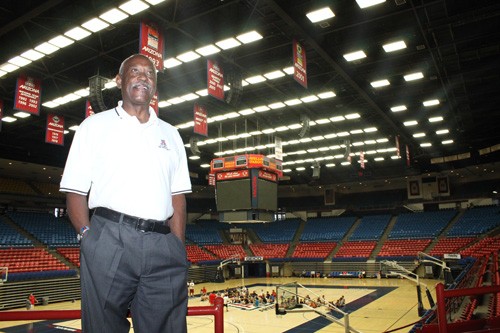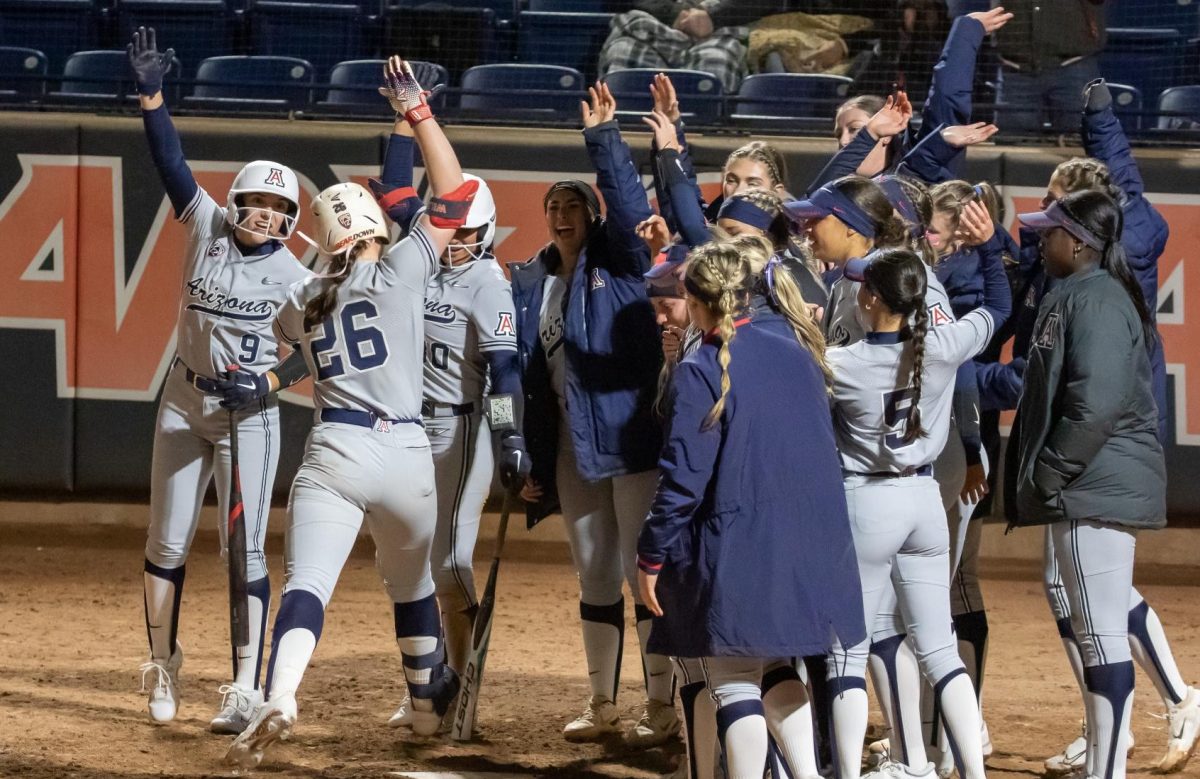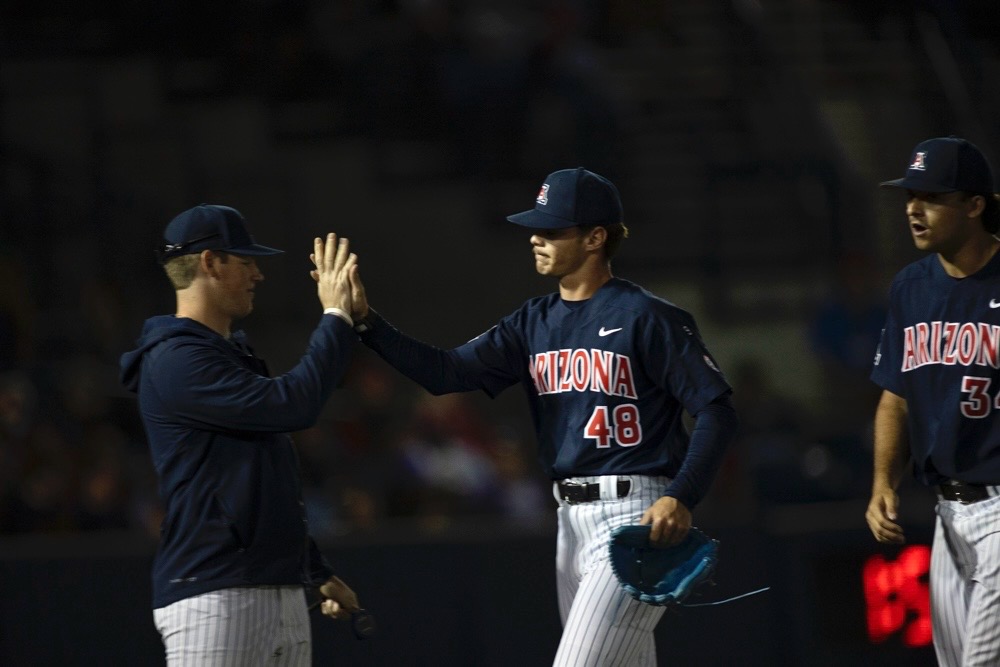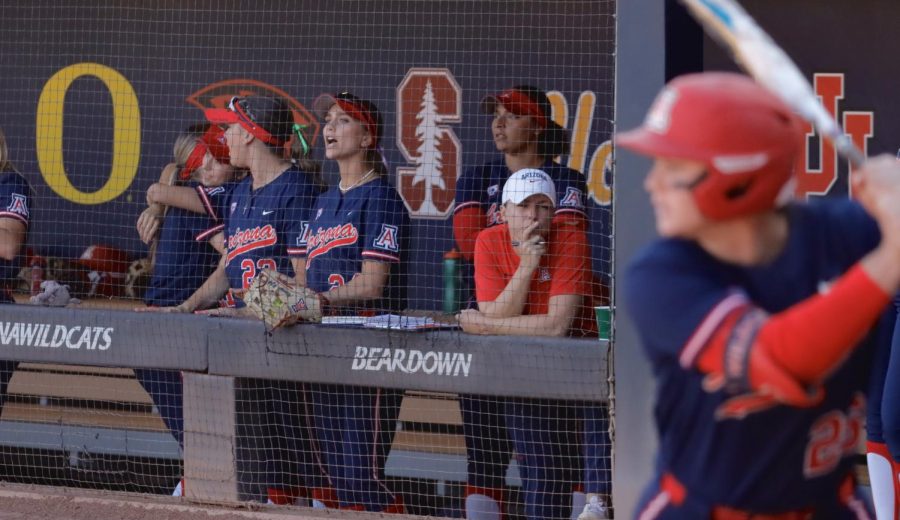Walking through the McKale Center’s Wildcat Gallery, one can get a glimpse of the individuals who have made an impact in Arizona Athletics, both past and present.
Starting from the south end, the gallery displays snapshots, in large frames, of past athletes in competition during their time at Arizona. Moving north along the hallway, to the right are framed portraits of the current Arizona coaches and athletic department administrators.
Proceeding past the administrative suites, a few more snapshots of past athletes can be seen before the hall comes to an end on the north side through a door that leads you to the exits near the Zona Zoo entrance, in what appears to be the end of the gallery.
If not careful, you could miss one of the most impactful individuals who has ever represented the Arizona Athletic department. To the left, just before the exit door at the end of the gallery, is the office of Arizona’s first ever national champion — Gayle Hopkins.
Hopkins, 68, represents the past and the present of Arizona Athletics, an All-American track and field athlete from 1961-64 and a critical piece in the administrative side of the athletics department for the last 18 years.
Hopkins originally came back to Arizona in 1983, to assume duties to help develop Arizona’s academic service office and later assumed development duties in 1992, under then-athletic director Cedric Demsey.
The former national champion was an associate to former athletic director Jim Livengood for his entire tenure at Arizona. Hopkins has been in charge of working with post-eligibility student-athletes, alumni clubs and keeping tradition alive.
As of July 1, after an impactful 27 years of work in the Arizona athletics department, Hopkins is set to retire.
“”It’s time to leave. I’m 68 years old, I have done everything that I could do,”” Hopkins said. “”I’m going to take a rest, then maybe start on something new in the community.””
Hopkins has made his mark on the athletics department and will be missed by many who worked with him during his nearly three decades of work at Arizona.
“”Gayle is the best, I’ve thoroughly enjoyed him for all the years we’ve worked together,”” said senior associate athletic director John Perrin. “”He was always an advocate for the student-athlete and he helped our coaches recruit through the years.
“”In the last 10 years, he headed up the Letterwinner’s Club. With that, he created a program that really didn’t exist and now, we have thousands of letter winners that are in touch with the athletic department. I don’t know if you can really replace someone that been around for 27 year, its going to be hard to do,”” Perrin added.
Hopkins also impacted former players such as Wally Brumfield, who played football at the UA from 1970-73. Brumfield also played for the San Francisco 49ers a few years after leaving the UA, but never finished school.
In 1996, long after his playing days were done, he decided to come back to the UA to get his degree. Hopkins was there to guide Brumfield through the process of attaining the political science degree he now has.
“”He’s helped so many athletes that come through Arizona, especially athletes that are away from home,”” Brumfield said. “”He’s going to be truly missed. If I had any problems I went to him to get them resolved.””
Now that Hopkins will soon retire, new athletic director Greg Byrne will be forced to look for a replacement. Hopkins, a former Olympian, would like to see an African American get an opportunity to replace him, due to the scarce number who hold administrative positions at the UA.
“”We look on this campus — how many black professors do we have? How many black deans do we have?”” Hopkins said. “”When you come over here (to athletics), at least we’ve got me.””
Hopkins is the only African American in the athletics department to hold a major administrative position, but he does admit that the athletic department has done an “”OK”” job of trying to change that.
“”We’re not great, but we have done a good job in trying to add black professionals,”” he said. “”But we’re not even close to where we can be and should be.””
As a product of the ‘60s, Hopkins, who was in his early 20s during the Civil Rights Movement, worries that African Americans may not get those administrative positions and that his generation should share that blame.
“”We didn’t pass it on from to the ‘60s to now,”” Hopkins said of his generation’s failures to help the young black generation. “”We as (older) black folks didn’t do a good job of teaching, guiding and directing young folks to administrative positions when we’re out of the system.””
Hopkins acknowledges that former Athletic Director Jim Livengood took steps toward changing the number of black professionals. Every year for 16 years, Livengood and
Hopkins met with the black community several times each year.
“”For 16 years Jim Livengood and I have had advisory meetings with the black community,”” Hopkins said. “”No other athletic director in the United States has ever dared to meet with a black community on the one-on-one basis. Jim was always available and he listened.””
Hopkins was the president of the University of Arizona Black Alumni Association for 20 years and has a few words of advice for young African Americans in administrative roles.
“”Don’t be a ‘yes man,’ don’t be a ‘just for show,’ you should know your role but don’t be somebody for only the Christmas parties,”” he said. “”They need to make sure they have a role.””
Hopkins’ office in McKale is nearly empty and he will now tackle post-retirement challenges to fill a void left during his down time.
“”I have an interest in young kids who didn’t get their high school diploma, I want to help them get their GED,”” he said. “”I’m an educator, just because my time is done at Arizona, doesn’t mean I won’t continue to educate.””









